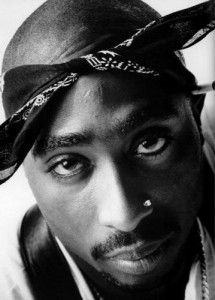Commemorating Tupac on the anniversary of his death
- September 13th, 2010
- By djmutiny
- Write comment
The son of a very well-known New York Black Panther, Afeni Shakur, Tupac was exposed to the ideas of black power and freedom from a very early age (his godfather was Geronimo Pratt, one of the leading Panthers and a long-term political prisoner). Nonetheless, unlike a lot of other ‘conscious’ hip-hop MCs, Pac was from the *street*. He didn’t go to college; he didn’t grow up in relative comfort. He grew up in the projects, and he always identified with the disenfranchised, disenchanted, impoverished young people he grew up with.
Pac grew in the aftermath of an intense political struggle in which many of his family’s friends and relatives had been killed or imprisoned. In her book ‘The War Before’, Safiya Bukhari (another New York Panther who was a close friend of Afeni’s) points out that everyone who came through this struggle was, to some extent, suffering from post-traumatic stress disorder. To see your friends die in shoot-outs; to operate ‘underground’; to go to prison; to suffer solitary confinement – all of these things have an impact on your psychological health. Afeni, like a number of other Panther veterans, became addicted to crack cocaine in the early 1980s. As a result, Tupac’s childhood was highly unpredictable, and the contradiction of his family’s Panther legacy and his own erratic, impoverished childhood is one of the main themes that defines his life and his music.
Tupac more than any other rapper bridges the generation gap between the black power generation of the late 1960s and early 1970s and the hip-hop generation of the 1980s onwards. He brings the Panther legacy to his music, but he does it in order to bring certain ideas to bear on the struggles of his generation, rather than just giving a history lesson. Unfortunately, once he hooked up with Death Row records in the later part of his career, his music took on a much less positive, much less revolutionary, much more gangsta aspect. However, his earlier albums stand out as some of the best works of political art in recent memory.
Here is the video to ‘Changes’, one of Pac’s most heartfelt and memorable songs, the lyrics for which contain some real depth and insight. The song is an indictment of the oppression of African people in the US, and a call to oppressed people to start working together and to stop killing each other.
Pac makes an important point that many seasoned politicians (even on the left) don’t properly understand, relating the situation in the Middle East to the situation in the ghettoes of the United States:
And still I see no changes, can’t a brother get a little peace?
There’s war in the streets and war in the Middle East
Instead of war on poverty, they got a war on drugs
So the police can bother me
With a note of desperation, he points out that the most vibrant struggle of black people in the US to gain freedom and equality was struck down ruthlessly by the state:
It’s time to fight back, that’s what Huey [Newton] said
Two shots in the dark, now Huey’s dead
But the real message of the song is more optimistic: we need to stop doing what the oppressors want us to do, and we need to unite.
I got love for my brother, but we can never go nowhere
Unless we share with each other
We gotta start makin’ changes
Learn to see me as a brother instead of two distant strangers
Tupac Amaru Shakur, RIP

